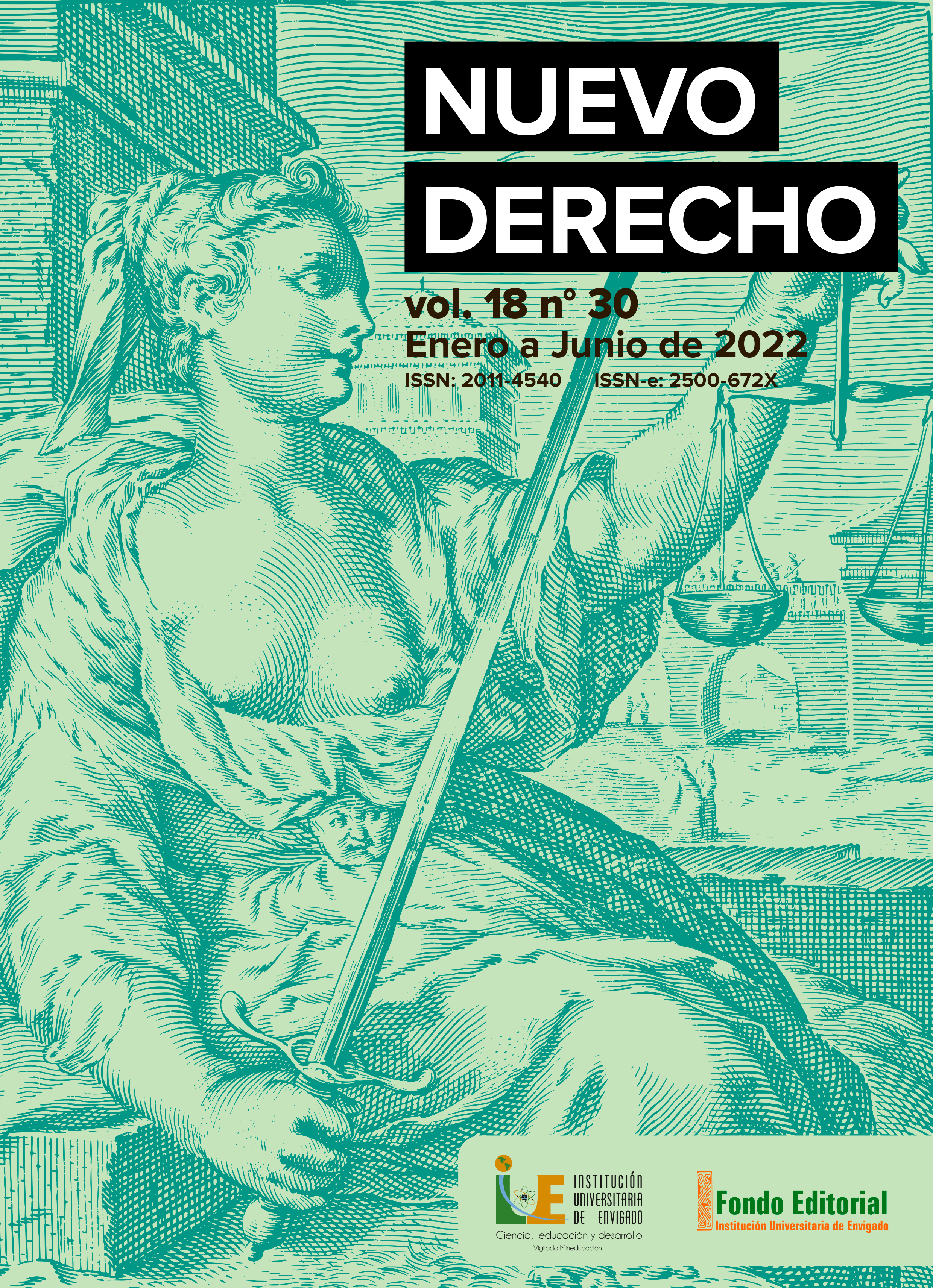The job stability reinforced for pregnant women: an analysis of a decision of the Colombian Constitutional Court
DOI:
https://doi.org/10.25057/2500672X.1437Keywords:
Job stability, Irremediable damage, minimum vitality, pregnant womenAbstract
Through the sentence object to analysis T-043/20, The Constitutional Court confirmed its jurisprudential posture in favor of reinforced labor stability for pregnant women, thus complying with the diverse legal and politically public measures to develop an obligation to guarantee the vital minimum for pregnant and nursing women; this way, the precedence of action protection in this subject evades an irremediable prejudice when the reasons for not continuing a labor relationship do not comply with objective legal causes relevant to internal legislation. In this sense, the purpose of this analysis is to
address the scope of the Court’s ruling with respect to its object of development, and, to demonstrate the importance of this article as a jurisprudential review in the investigative framework of constitutional correctness, the reinforced protection that pregnant women in Colombia must have from any discriminatory act that is due precisely to their pregnancy status, as an illegitimate and illegal argument to terminate or not renew a labor
contract. ; when the objective grounds for termination are not configured as provided by the Substantive Labor Code.
Author Biographies
Diana Marcela Trujillo Vallejo, Universidad de Medellín. Colombia
- Specialist in Criminal Procedural Law from the Universidad Autónoma Latinoamericana, UNAULA. Colombia
- Master in Law from the Universidad de Medellín, UDEM. Colombia
- Doctor in Law from the Universidad de Medellín, UDEM. Colombia
- Lawyer from the Universidad Autónoma Latinoamericana, UNAULA. Colombia
- Professor at the Tecnológico de Antioquia. Colombia
- Professor of postgraduate courses at the Universidad de Medellín, UDEM. Colombia
- diana.trujillo32@tdea.edu.co
Ana Isabel Arango Giraldo, Institución Universitaria Pascual Bravo, Medellín. Colombia
- Lawyer from the Universidad Autónoma Latinoamericana (UNAULA). Colombia
- Political scientist from Universidad Nacional de Colombia
- Specialist in Administrative Law from UNAULA. Colombia
- Master in Educational Technology Management from the Universidad de Santander. Colombia
- Professor at the Instituto Tecnolígico Metropolitano ITM. Colombia
- anaarango2126@correo.itm.edu.co
References
Asamblea Nacional Constituyente. (1991). Constitución Política de Colombia. Bogotá, Colombia.
Asamblea General de la Organización de los Estados Americanos (1994). Convención Interamericana para prevenir, sancionar y erradicar la violencia contra la mujer “Convención de Belém do Pará». Ley 24.632. 1 de abril de 1996. Belem Do Para, Brasil. https://www.te.gob.mx/transparencia/media/files/cf83ab8278fbeda.pdf
Corte Constitucional. (1997). Sentencia C-470. Magistrado Ponente: Alejandro Martínez Caballero: 25 de septiembre de 1997. Bogotá, Colombia.
Corte Constitucional. (2007). Sentencia T-632. Magistrado Ponente: Humberto Antonio Sierra Porto: 15 de agosto de 2007. Bogotá, Colombia.
Corte Constitucional. (2009). Sentencia T-887. Magistrado Ponente: Mauricio González Cuervo: 1 de diciembre de 2009. Bogotá, Colombia.
Corte Constitucional. (2014). Sentencia T-041. Magistrado Ponente: Luis Ernesto Vargas Silva: 31 de enero de 2014. Bogotá, Colombia.
Corte Constitucional. (2014. Magistrado Ponente: Jorge Ignacio Pretelt Chaljub: 20 de agosto de 2014. Bogotá, Colombia.
Corte Constitucional. (2016). Sentencia T-320. Magistrado Ponente: Alberto Rojas Ríos: 21 de junio de 2016. Bogotá, Colombia.
Corte Constitucional. (2017). Sentencia T-313. Magistrado Ponente: Alejandro Linares Cantillo: 11 de mayo de 2017. Bogotá, Colombia.
Corte Constitucional. (2018). Sentencia T-030. Magistrado Ponente: José Fernando Rey Cuartas: 12 de febrero de 2018. Bogotá, Colombia.
Corte Constitucional. (2018). Sentencia SU-075. Magistrado Ponente: Gloria Stella Ortiz Delgado: 24 de julio de 2018. Bogotá, Colombia.
Corte Constitucional. (2020). Sentencia T-043. Magistrado Ponente: José Fernando Reyes Cuartas: 10 de febrero de 2020. Bogotá, Colombia.
Presidencia de la República. (1950). Decreto 2663. Código Sustantivo del Trabajo [CST]. (7 de junio de 1951). Diario Oficial 274072. Bogotá, Colombia.
Presidencia de la República. (1991). Decreto 2591. [Departamento Administrativo de la Presidencia de la República]. Diario Oficial 40165. Bogotá, Colombia.
Oficina del Alto Comisionado de las Naciones Unidas para los Derechos Humanos. (1979). Convención sobre la eliminación de todas las formas de discriminación contra la mujer. https://www.ohchr.org/sp/professionalinterest/pages/cedaw.aspx
How to Cite
Downloads
Downloads
Published
Issue
Section
License
Copyright (c) 2022 Nuevo Derecho

This work is licensed under a Creative Commons Attribution-NonCommercial-ShareAlike 4.0 International License.
Authors should declare that the article is an original work that has not been totally or partially published in any print or electronic media, which has not been submitted simultaneously to another publication and that is not currently under evaluation in another publication. On the other hand, I leave (we) evidence that the statements made therein are the sole responsibility of the / the authors / is.
All data and references to already published material are properly identified with their respective credit and included in the bibliographical notes and appointments that stand out as such and, in cases that require it, I have the proper authorizations for those with the respective rights; in case of any dispute or claim relating to intellectual property rights, we take responsibility exonerating responsibility to Nuevo Derecho.
If the article is approved for publication, the authors transfer the copyright to the journal New law to publish, distribute electronic copies and included in indexing services, directories or databases of national and international data on Open Access under the Creative Commons 3.0 Attribution-Noncommercial (CC bY-NC-SA) by which the authors retain their copyrights and allow them to others copy and distribute your work provided they recognize the corresponding authorship and the work is not used for purposes commercial.
Therefore, new law does not retain the rights to reproduce or copy (copyright), so the authors will have the final versions, to disseminate them in institutional repositories, personal blogs or any other electronic or print media, with the sole condition to make mention of the original source of publication, in this case Nuevo Derecho.

| Article metrics | |
|---|---|
| Abstract views | |
| Galley vies | |
| PDF Views | |
| HTML views | |
| Other views | |




